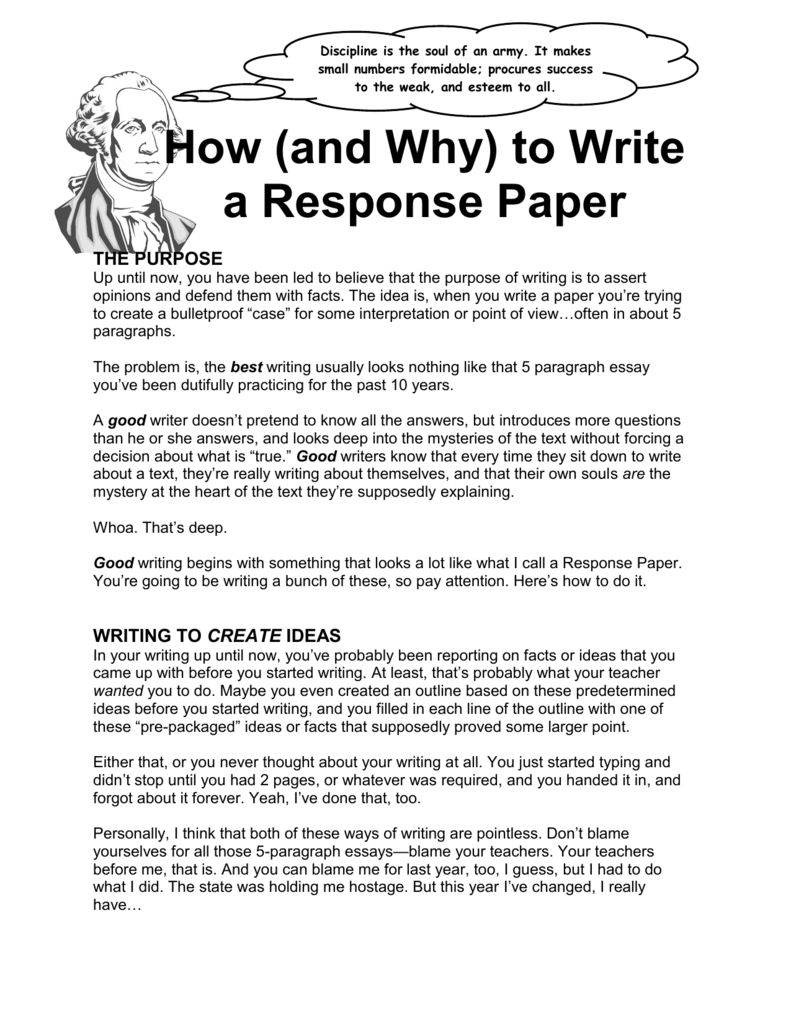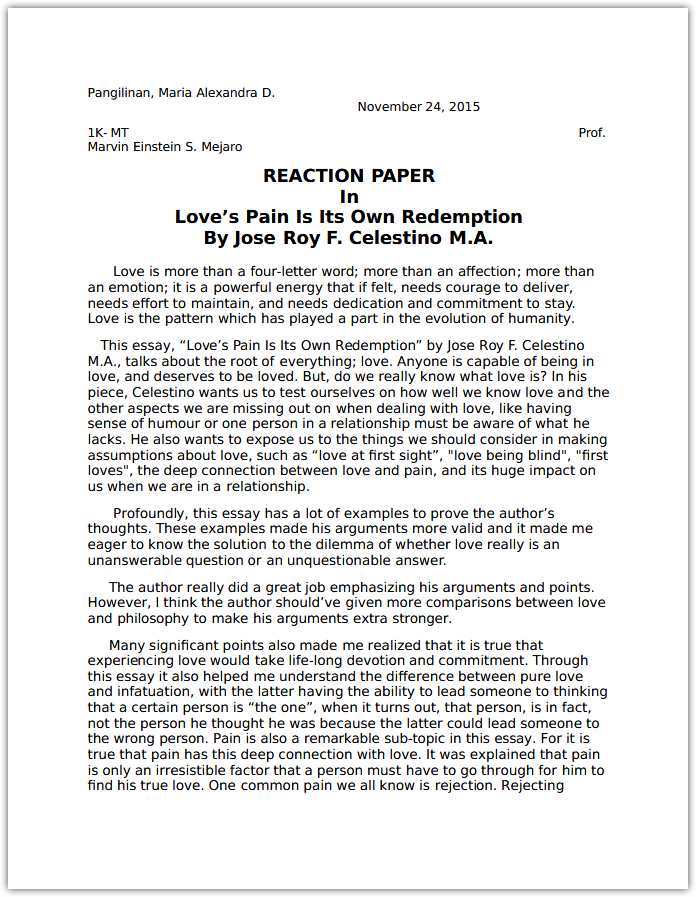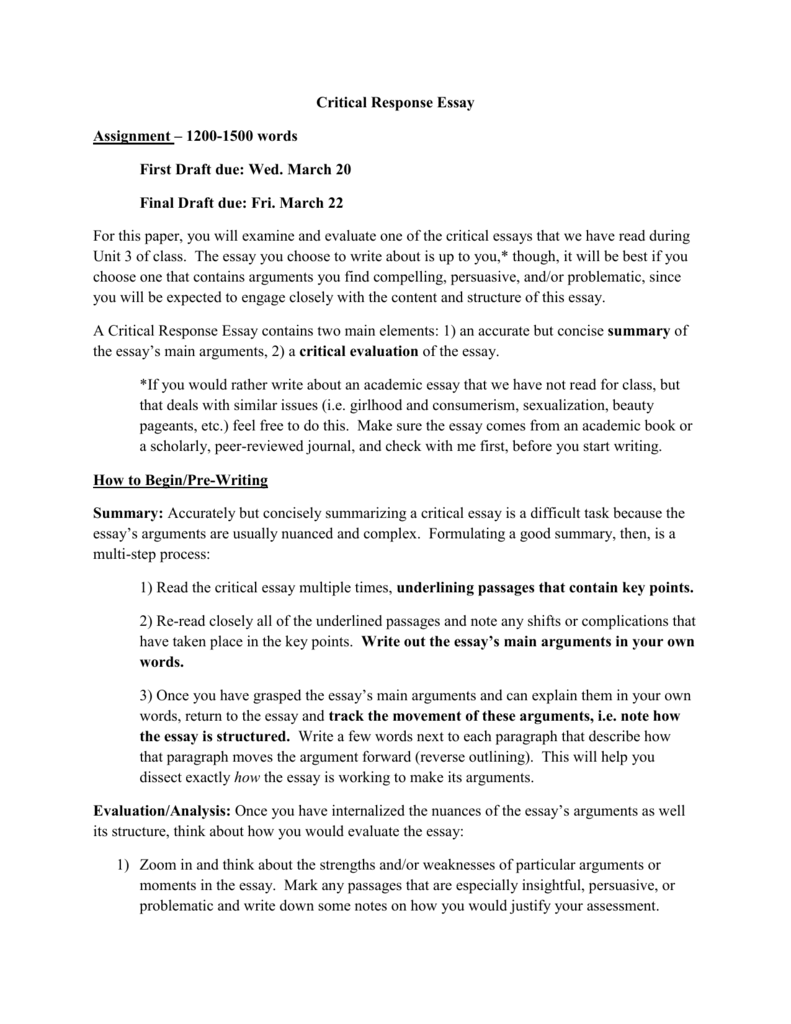
7/1/ · A reaction paper is the right assignment to show your attainments of analysis and critical thinking. The reaction paper concept is reminiscent of a mixture of a research paper and an expository essay. You must provide basic information about the text that you will analyze. This includes the author, publication date, and idea of the article Here are a few recommendations, which will help you complete an outstanding reaction paper: Read the original article carefully and highlight the main ideas and points you want to discuss; Describe your point of view and back it with additional information if needed 13/4/ · The first thing that you must do is summarize the text by writing the reaction paper outline format (or you can call it a sample). Developing your outline for the reaction paper will help keep you focused and your thoughts in order
Writing a Response or Reaction Paper — Hunter College
Last Updated: October 9, References Approved. This article was co-authored by Rachel Writing a reaction paper, PhD. Rachel Scoggins is a Visiting Assistant Professor of English at Lander University. Rachel's work has been presented at the South Atlantic Modern Language Association and the Writing a reaction paper International Conference on Information Literacy.
She received her PhD in Literary Studies from Georgia State University in There are 10 references cited in this article, writing a reaction paper, which can be found at the bottom of the page. wikiHow marks an article as reader-approved once it receives enough positive feedback.
This article has 15 testimonials from our readers, earning it our reader-approved status. This article has been viewedtimes. A reaction or response paper requires the writer to analyze a text, then develop commentary related to it. It is a popular academic assignment because it requires thoughtful reading, research, and writing.
You can learn how to write a reaction paper by following these writing tips. To write a reaction paper, start by carefully analyzing the thing you're supposed to be reacting to. Then, write down your initial reactions and thoughts. Try to come up with an angle for your paper, like that you disagree with the subject or that you think it has a deeper meaning.
Once you've got an angle, summarize it in the introduction of your paper and use the body paragraphs to support it. Remember to use direct quotes and specific examples to back up what you're saying. When you're finished, writing a reaction paper, reread your paper to make sure your angle is clear. If you want to learn how to set up topic sentences in your paragraphs from our Literary Studies Ph. co-author, writing a reaction paper, keep reading!
Did this summary help you? Yes Writing a reaction paper. Log in Social login does not work in incognito and private browsers. Please log in with your username or email to continue. wikiHow Account. No account yet? Create an account. Community Dashboard Write an Article Request a New Article More Ideas Edit this Article. Courses New Tech Help New Expert Videos About wikiHow Pro Upgrade Sign In.
Home Random Browse Articles Courses New About wikiHow Easy Ways to Help Approve Questions Fix Spelling Quiz App More Things to Try We use cookies to make wikiHow great.
By using our site, you agree to our cookie policy. Cookie Settings. wikiHow is where trusted research and expert knowledge come together. Learn why people trust wikiHow. Categories Education and Communications College University and Postgraduate Academic Writing Essays How to Write a Reaction Paper. Download Article Explore this Article parts. Writing Help. Tips and Warnings. Related Articles. Article Summary. Co-authored by Rachel Scoggins, PhD Last Updated: October 9, References Approved.
Part 1 of Understand the purpose of a reaction paper. Reaction or response papers are assigned so that after reading a text, you will think carefully about what you feel or think about the text. A reaction paper is not just a paper where you express your opinion, writing a reaction paper.
These papers require a close reading of the text that goes beyond the surface meaning, writing a reaction paper. You must respond to implied ideas, and elaborate, evaluate, and analyze the author's purpose and main points. In many cases, you can use the first-person "I" while writing reaction papers.
If you are asked to agree or disagree, you have to provide convincing evidence about why you feel this way. If responding to one text, you probably should connect the text to overarching concepts and themes you have discussed in the class. The same assignment may also be given to films, lectures, field trips, labs, or even class discussions. It also does not state, "I liked this book because it was interesting" or "I hated this because it was boring.
Figure out what the assignment is asking. Before beginning your paper, you must figure out exactly what your teacher or professor is looking for. Some teachers want you to react by analyzing or evaluating the reading. Other teachers want a personal response. Make sure you understand which kind of reaction the assignment calls for. If you are unsure, ask the teacher to clarify what they expect from the assignment. You writing a reaction paper be asked to react to the text in light of another text.
If this is the case, you will want to use quotations from both texts in your writing. You may be asked to react to the text in the light of the class themes.
For example, if you read a book in a Sociology of Gender Roles class, you will want to read, annotate, and react based on how gender roles are described in the book. You may be asked to react personally to the text. This is less common, but occasionally the teacher simply wants to know if you have read the text and thought about it.
In this case, you should focus on your opinions of the book. Read the text you are assigned right after it is assigned. To complete a reaction paper, you don't just read, writing a reaction paper, give your opinion, and turn in the paper. A reaction paper synthesizes the texts, writing a reaction paper, which means you take the information you read and bring it together so you can analyze and evaluate.
You have to give yourself time to do the readings, but more importantly, to digest what you've read so you can put the ideas together. One of the biggest mistakes that students make is waiting until the last minute to read and react.
A reaction is a thoughtful consideration after reading and rereading several times. You may need to reread the text multiple times. First, to read and familiarize yourself with the text, then again to start thinking about the assignment and your reactions. Write down your initial reactions. After you read through the first time, jot down your initial reactions to the text.
Do the same thing on any subsequent readings. Try completing some of the following sentences after you read: I think that Annotate the text as you read.
As you read through the text again, annotate it, writing a reaction paper. Annotating in the margins of the text allows you to easily locate quotations, plot lines, character development, or reactions to the text. If you fail to annotate thoroughly, it will be more difficult to create a cohesive reaction paper. Question as you read. As you read the text, you have to start questioning the text. This is where your evaluation of the material and your reaction begins.
Some questions to consider include: What issues or problems does the author address? What is the author's main point? What points or assumptions does the author make, writing a reaction paper how does she back that up?
What are strengths and weaknesses? Where are problems with the argument? How do the texts relate? Part 2 of Start by freewriting your reactions and evaluations of the author's ideas.
Try to put into words what you think the author is trying to do and whether you agree or disagree. Then ask yourself why, and explain why you think these things. Freewriting is a great way to start getting your ideas on paper and getting past that initial writer's block. Determine what your strongest and most convincing reactions are.
Prioritize your points.
Guide to Writing Reaction Paper
, time: 11:49What is a Reaction Paper: Tips on How to Write and examples

Here are a few recommendations, which will help you complete an outstanding reaction paper: Read the original article carefully and highlight the main ideas and points you want to discuss; Describe your point of view and back it with additional information if needed 13/4/ · The first thing that you must do is summarize the text by writing the reaction paper outline format (or you can call it a sample). Developing your outline for the reaction paper will help keep you focused and your thoughts in order 14/8/ · A reaction paper is a form of essay in which you reveal your thoughts about a play, book, article, or any other literary work. This kind of academic writing has many parallels with a reaction paper because it contains your reaction to the reviewed work

No comments:
Post a Comment